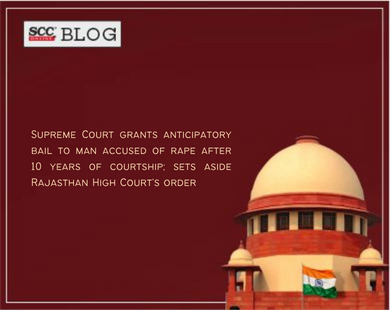Supreme Court: In an alleged rape case, the petitioner gets a breather when granted the benefit of anticipatory bail by the bench of Sanjiv Khanna and M.M. Sundresh, JJ with the directions that in the event of arrest, the petitioner shall be released on bail by the arresting officer on terms and conditions fixed by the trial court as well as comply with the mandate of Section 438(2) of Code of Criminal Procedure, 1973 (‘CrPC’). The Court, while allowing the special leave petition filed by the petitioner, sets aside the order passed by the Rajasthan High Court which had dismissed the anticipatory bail application without considering the facts and circumstances of the case.
The Court, however, made clear that the grant of anticipatory bail to the petitioner would not influence the case on merits which is pending before the Rajasthan High Court.
Issues:
- Whether sexual intercourse by a couple in a long romantic relationship amounts to rape if one party chooses not to marry the other after the courtship is over?
- Whether if the male partner chooses to exit from a romantic relationship and not culminate the same into marriage, the sexual intercourse during the period of courtship will be treated as without consent at all times?
- What are the parameters on which consent for sexual intercourse be analysed for the purposes of Section 90 and 375 of Penal Code, 1860 (‘IPC’), if the parties have been in lengthy romantic relationship?
-
What are the criteria to evaluate factors including promise to marry, breach of promise to marry, false promise of marriage, while deciding bail in apprehending the arrest of the male partner in the relationship?
Questions pertaining to what can amount to rape in cases of sexual intercourse taking place in a romantic relationship and subsequently resulting into non-fulfillment of promise of marriage, has become a burning issue in today’s society.
The petitioner had claimed that the sole purpose for filing of First Information Report (‘FIR’) was to harass the petitioner, as the complainant was aware about the marriage of the petitioner with another woman. The complainant and the petitioner were voluntarily in a live-in relationship for 10 years till 2017, however, the complainant voluntarily got engaged to another man in February 2017, which was not opposed by the petitioner. It was stated that since the very inception of their courtship, the petitioner had made his intentions to not to marry, comprehensible to her as they belonged to different castes and both their families posed stiff opposition, thus, not leading to misconception of facts.
The decision in Pramod Suryabhan Pawar v. The State of Maharashtra, (2019) 9 SCC 608 was relied upon by the petitioner, wherein it was observed that “to summarize the legal position that emerges from the above cases, the “consent” of a woman with respect to Section 375 IPC must involve an active and reasoned deliberation towards the proposed act. To establish whether the “consent” was vitiated by a “misconception of fact” arising out of a promise to marry, two propositions must be established. The promise of marriage must have been a false promise, given in bad faith and with no intention of being adhered to at the time it was given. The false promise itself must be of immediate relevance, or bear a direct nexus to the woman’s decision to engage in sexual act”
The Petitioner also relied upon Uday v. State of Karnataka, (2003) 4 SCC 46 wherein it was held that “there is yet another difficulty which faces the prosecution in this case. In a case of this nature two conditions must be fulfilled for the application of Section 90 IPC. Firstly, it must be shown that the consent was given under a misconception of fact. Secondly, it must be proved that the person who obtained the consent knew, or had reason to believe that the consent was given in consequence of such misconception. We have serious doubts that the promise to marry induced the prosecutrix to consent to having sexual intercourse with the appellant. She knew, as we have observed earlier, that her marriage with the appellant was difficult on account of caste considerations. The proposal was bound to meet with stiff opposition from members of both families. There was therefore a distinct possibility, of which she was clearly conscious, that the marriage may not take place at all despite the promise of the appellant.”
It has been argued that as there is no straight jacket formula for determining whether consent given by the prosecutrix to sexual intercourse is voluntary, or whether it is given under a misconception of fact, the Court must, in each case, consider the evidence before it and the surrounding circumstances, before reaching a conclusion, because every case has its own peculiar facts which may have a bearing on the question whether the consent was voluntary, or was given under a misconception of fact.
[Mukesh Kumar Singh v. State of Rajasthan, 2022 SCC OnLine SC 1687, decided on 01.12.2022]
Advocates who appeared in this case :
For Petitioner: Namit Saxena, Advocate on Record;
Anil Kumar Upman, Advocate on Record;
For Respondent: Advocate Saurav Roy;
Prabudh Singh;
Kaushal Sharma;
Milind Kumar.







